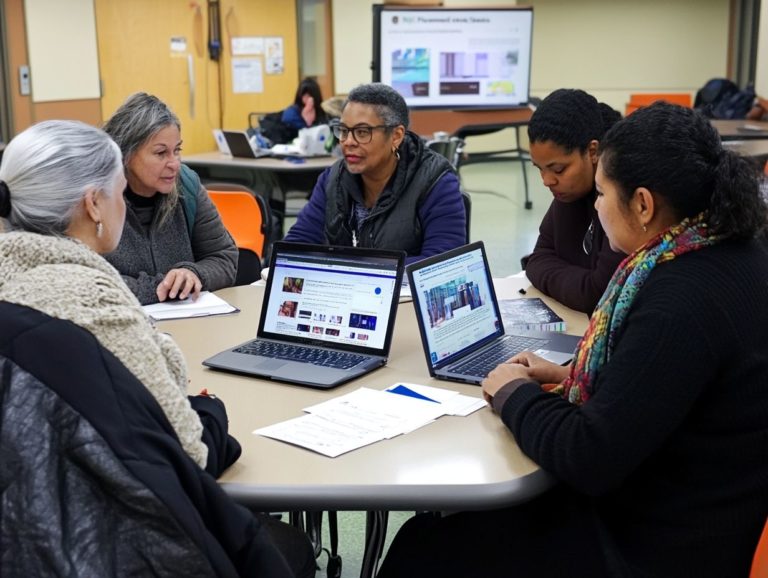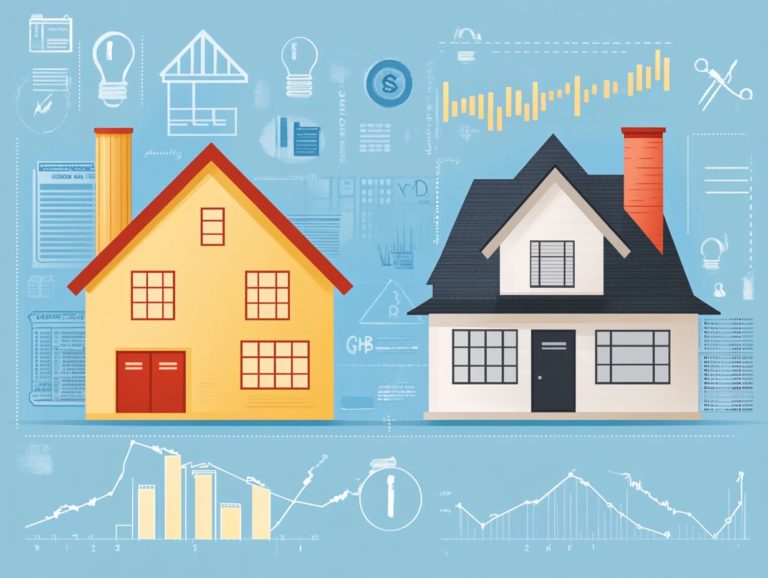The Importance of Locking in Your Mortgage Rate
Navigating the world of mortgage rates can feel overwhelming, but grasping the details can save you a significant amount of money.
This article breaks down what mortgage rates are, the factors that influence them, and why locking in a rate is essential for your financial well-being. You ll explore the benefits and risks associated with locking a rate, discover the optimal timing for this decision, and learn practical steps to secure the best deal.
Moreover, effective strategies for negotiating your mortgage rate will be shared. Prepare to empower yourself with knowledge that could make a substantial difference in your home-buying journey!
Contents
- Key Takeaways:
- Understanding Mortgage Rates
- Why Locking in Your Mortgage Rate is Important
- When to Lock in Your Mortgage Rate
- How to Lock in Your Mortgage Rate
- Steps to Take to Secure a Rate
- Tips for Negotiating Your Mortgage Rate
- Frequently Asked Questions
- What is the importance of locking in your mortgage rate?
- When should I consider locking in my mortgage rate?
- How does locking in my mortgage rate protect me from rising interest rates?
- What happens if interest rates decrease after I lock in my mortgage rate?
- Is there a fee for locking in my mortgage rate?
- Can I change my mind after locking in my mortgage rate?
Key Takeaways:
Locking in your mortgage rate protects you from potential rate increases, providing stability and peace of mind.
Consider factors such as your financial situation and current market conditions before deciding when to lock in your mortgage rate.
Negotiating your mortgage rate can save you thousands of dollars in interest over the life of your loan.
Understanding Mortgage Rates
Understanding mortgage rates is essential for you as a prospective homebuyer or borrower. These rates can seriously affect your wallet and your financial decisions within the housing market.
Various factors influence mortgage rates, including economic shifts, Federal Reserve policies, and the availability of mortgage-backed securities.
Each lender may present different rates, so being aware of how these rates fluctuate gives the power to you to make informed choices throughout the mortgage application and closing process.
What is a Mortgage Rate?
A mortgage rate is essentially the interest rate applied to a mortgage loan, and it can have a significant impact on both the total cost of your home purchase and your monthly payments.
Understanding mortgage rates is paramount for you as a potential homeowner, as they play a pivotal role in determining how affordable and feasible buying a property really is.
These rates generally fall into two categories: fixed and adjustable-rate mortgages, each with its own set of advantages and risks.
A fixed-rate mortgage offers the comfort of a consistent interest rate throughout the life of the loan. This means your monthly payment will stay the same, making budgeting easier.
In contrast, an adjustable-rate mortgage may begin with a lower interest rate but can fluctuate over time, which might lead to increased costs.
This variability in rates directly affects your loan approval, as lenders take a close look at your ability to manage potential fluctuations in payments during the mortgage application process.
Factors that Affect Mortgage Rates
Mortgage rates can be quite the rollercoaster, influenced by a myriad of factors such as economic changes, Federal Reserve decisions, and the overall state of the housing market.
Key economic indicators, particularly inflation and employment statistics, play a vital role in shaping these rates. When inflation rises, lenders often respond by bumping up rates to protect their profit margins.
The Federal Reserve’s monetary policy has a direct impact on mortgage rates. For example, when the Fed adjusts the federal funds rate, it can either encourage borrowing with lower rates or help control inflation by making loans pricier.
Shifts in the dynamics of housing supply and demand can also influence mortgage rates. In a competitive market, for instance, you might find interest rates climbing higher.
Why Locking in Your Mortgage Rate is Important
Locking in your mortgage rate is an important step when buying a home. It safeguards you against potential interest rate hikes and offers peace of mind in unpredictable financial markets.
By securing a specific interest rate for a set duration known as the lock period you gain an advantage, especially when mortgage demand is on the rise or when economic conditions are less than stable.
It’s crucial to familiarize yourself with the associated lock fee, as well as the options available for rate extensions and float down provisions. This ensures you make informed decisions every step of the way.
Act now to lock in your rate and protect your future!
Benefits of Locking in a Rate
Locking in your mortgage rate offers many advantages, especially for homebuyers like you. It provides the security of a stable interest rate during uncertain times, allowing you to make informed financial decisions as you navigate the closing process.
This smart choice secures lower monthly payments, making homeownership more accessible. It also protects you from unpredictable interest rates, enabling you to confidently budget for housing costs.
This effective measure can lead to substantial long-term savings. Even a slight increase in market rates can significantly impact your overall mortgage expenses.
Understanding the benefits of locking in a rate is crucial for entering the housing market successfully.
Risks of Not Locking in a Rate
Not locking in your mortgage rate puts you at risk, especially with rising interest rates, which can complicate your mortgage application.
Unexpected interest rate hikes could lead to much higher monthly payments, straining your budget. This unpredictability can also create anxiety during your home-buying journey.
Without a rate lock, you risk missing lower rates and might even get priced out of the market. You need to understand and manage these risks for effective home financing.
When to Lock in Your Mortgage Rate
Knowing the right moment to secure your mortgage rate is vital for you as a homebuyer. The timing can impact the total cost of your loan and your overall financial strategy.
The best times to lock in a rate are when interest rates are low or expected to rise. Keeping an eye on economic shifts can be beneficial.
Best Times to Lock in a Rate
The optimal moments to secure a mortgage rate usually align with positive economic trends. Stay informed about Federal Reserve announcements and interest rate forecasts.
Monitoring inflation rates and employment statistics can provide invaluable context. For instance, a dip in unemployment often signals rising consumer confidence, which could lead to higher rates.
If inflation remains low, locking in a mortgage rate during that period can be very beneficial. Major economic events, such as national elections, can also introduce rate volatility.
Being proactive and consulting with financial advisors during these times will equip you with the insights needed for timely decisions.
Factors to Consider Before Locking in a Rate
Before locking in your mortgage rate, consider several factors, such as the length of the lock period, any applicable fees, and the float down provisions offered by your lender.
Explore various options from different lenders. Each may offer unique terms or deals that can influence your total costs.
By comparing rates, fees, and features, you can find the best deal for your financial situation. Understanding how the lock period affects rates will help you determine the right moment to secure a favorable rate.
How to Lock in Your Mortgage Rate
Locking in your mortgage rate is a straightforward process with a few essential steps. This ensures a smooth transition from your mortgage application to closing.
Start by consulting your lender to understand their requirements for a mortgage rate lock. This includes any fees or conditions that might influence your loan approval.
Knowing these details will help you navigate the process with confidence and clarity.
Steps to Take to Secure a Rate
Securing a mortgage rate lock involves several essential steps, starting with obtaining a loan estimate from your mortgage lender. This document outlines the terms and conditions of your potential loan, giving you a clear picture of what to expect.
Once you have that loan estimate in hand, it s wise to utilize mortgage calculators. These are online tools that help you estimate your monthly payments based on different interest rates and loan terms. They allow you to evaluate various scenarios and potential outcomes based on different rates and terms, helping you make sense of the numbers.
Understanding the implications of the lock period is crucial, as it determines how long your interest rate will stay fixed, shielding you from market fluctuations that could impact your financial plans.
You should also ask about any fees associated with the rate lock and clarify what actions you ll need to take if you require an extension later on. By thoughtfully assessing these factors, you can make informed decisions, paving the way for a smoother journey toward securing favorable financing.
Tips for Negotiating Your Mortgage Rate
Negotiating your mortgage rate can lead to significant savings over the life of your loan, making it important for homebuyers to save money.
By utilizing effective strategies, you can engage with mortgage lenders to secure the best possible rate available in today’s market.
Strategies for Getting the Best Rate
To secure the best mortgage rate, embrace several key strategies. Start by comparing multiple mortgage lenders and focus on improving your credit score before applying.
By taking the time to shop around and evaluate various offers, you can uncover competitive rates and terms that might otherwise slip through the cracks. It s also wise to explore alternative lending options, like credit unions or online lenders, which often present enticing deals.
Improving your credit score can significantly affect the rates available to you. This might involve:
- Paying down existing debts
- Ensuring timely bill payments
- Disputing any inaccuracies on your credit reports
A proactive approach in both comparison and credit management gives you the power to secure more favorable mortgage conditions.
Frequently Asked Questions
What is the importance of locking in your mortgage rate?
Locking in your mortgage rate is important because it ensures that your interest rate remains the same throughout the life of your loan. This can save you thousands of dollars in interest payments over time.
When should I consider locking in my mortgage rate?
If interest rates are low or if you plan on staying in your home for a long period, it may be a good idea to lock in your mortgage rate. This gives you peace of mind and helps you plan your budget!
How does locking in my mortgage rate protect me from rising interest rates?
Locking in your mortgage rate protects you from rising interest rates because it guarantees that your rate will remain the same even if interest rates increase. This can save you from having to make higher monthly mortgage payments in the future.
What happens if interest rates decrease after I lock in my mortgage rate?
If interest rates decrease after you lock in your mortgage rate, you will still be locked in at the higher rate. However, some lenders may offer the option to renegotiate your rate if it drops significantly.
Is there a fee for locking in my mortgage rate?
Some lenders may charge a fee for locking in your mortgage rate, while others do not. It’s important to ask your lender about any potential fees before making the decision to lock in your rate.
Can I change my mind after locking in my mortgage rate?
In most cases, you are able to change your mind after locking in your mortgage rate. However, this may come with a fee or the requirement to re-qualify for the loan. It’s important to carefully consider your options before locking in your rate.






